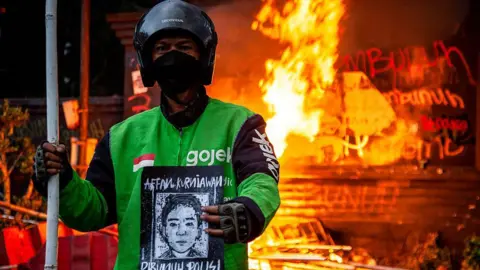Protesters have been killed, buildings torched and politicians' houses looted as anti-government unrest spreads across Indonesia - and the authorities respond with force.
Mass demonstrations, fuelled by cost-of-living woes and public frustration with the political elite, first erupted in Jakarta on 25 August to condemn what many viewed as excessive pay and housing allowances for parliamentarians.
By the end of the week, things had boiled over into violence. On Thursday night, following escalating clashes between demonstrators and authorities, police in Jakarta ran over and killed 21-year-old motorcycle rideshare driver Affan Kurniawan.
President Prabowo Subianto and the chief of police apologised for his death - but it fuelled further discontent that has now spread to various corners of the archipelago, from West Java to the islands of Bali and Lombok. At least seven people had died in the protests by Monday, according to Indonesia's co-ordinating minister for economic affairs.

The primary trigger for the protests was the Indonesian government's decision to raise the allowance for national parliamentarians.
Local media last month reported that they were paid upwards of 100 million rupiah (£4,499; $6,150) a month - more than 30 times the average national income - including a substantial housing allowance.
Meanwhile, everyday Indonesians were struggling because of a cost-of-living crisis.
As the government is undertaking austerity measures, and at a time when citizens are feeling economically insecure, the notion that Indonesia's already wealthy political class would see their incomes rise filled people with rage, and they spilled onto the streets to express that rage, Dr Eve Warburton, director of the Indonesia Institute at the Australian National University, told the BBC.
These protests spiralled after Affan's death, and have since grown to encompass issues of police brutality and accountability. But there are other systemic issues driving public anger: political corruption, social inequality and economic challenges from which the rich and powerful seem unfairly insulated.
In an attempt to quell the nationwide protests, President Prabowo announced on Sunday that several state-funded perks given to politicians would be reined in, including the size of some allowances.
While the move was welcomed by protesters, some suggest it doesn't go far enough.
It is not only about one issue, but about long-standing concerns with inequality, governance and accountability, he explained. Symbolic changes are important, but people expect deeper reforms, particularly in areas that affect ordinary citizens such as agricultural policy, education and fair economic opportunities.
Under ongoing protests, President Prabowo faces the most significant leadership challenge since his election in 2024. How he addresses the demands of the citizens while ensuring restraint from the authorities remains a pressing question amidst escalating unrest.



















